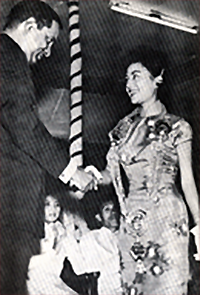
Julie Shih Yih tours the cities of India for 'Kingdom and the Beauty' 1961
'The Kingdom and the Beauty' (1958) starring Lin Dai was the blockbuster that started it all.
With its quality and a top notch cast, Shaw films produced in Hong Kong won back the Chinese box office from foreign competitors. The film rang up record numbers in tills all over Asia and then went on to be the first SB film to conquer the western market.
'Kingdom and the Beauty' started its world tour on October, 1961 when it screened in the major cities of India including Calcutta, Madras and Bombay.
The film then went on to Japan in November, with Lin Dai making a personal appearance there.
By August 1963, The Kingdom and the Beauty began screening in Sydney Palace Theatre. This was the first time a Chinese movie had ever been released in Australia. Palace lanterns were displayed to mark the occasion. It ran for two weeks and then began to tour the whole territory.
In September, another Lin Dai vehicle Madam Normal Snake premiered simultaneously in San Francisco and Honolulu Chinatown cinemas. Since June, it had wowed audiences in Taiwan and Saigon.
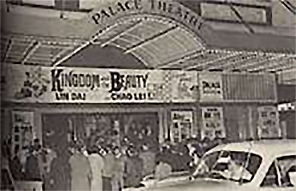
Palace Theatre, Sydney 1963
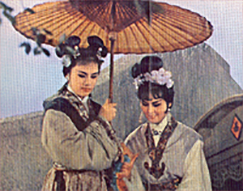
Madam Normal Snake, 1962
In Hong Kong where the film was released the previous year, the film grossed a record breaking HK$800,000 after a run of over a month at three first run theatres.
Press reviews on 'Madam Normal Snake' in the US were highly favourable with comments like The photography is exquisite from the San Francisco Chronicle. In Honolulu, the premiere was attended by Ms Vivien Shaw (right), the daughter of Sir Run Run Shaw and Chinese community leaders. Proceeds from the premiere benefited the Honolulu Buddhist Association.
By the close of 1963, Empress Wu had opened in Paris and The Magnificent Concubine aka 'Yang Kwei Fei' in London.
Both had played to packed houses in Hong Kong the year before, grossing around HK$600,000 each.
'The Magnificent Concubine' also had the distinction of being the first Chinese film ever to win a major prize at an international film festival when it won the Grand Prix prize at the 15th Cannes Film Festival in 1962.
Thanks to good dubbing, Shaw star Li Li-Hua who stars in both films spoke French in the Paris showings and English in the London performances. Empress Wu was praised by LEspoir, the influential French daily as an undeniable success. Le Provencal also praised its colour, acting and directing.
Buoyed by a successful showing at the Berlin and Cannes Film Festival in 1963, 'Empress Wu' went on to become the then widest released Chinese film in history, playing the cities of Europe, Africa and the Middle East.
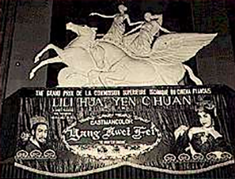
Banner of Yang Kwei Fei in Capitol, 1961
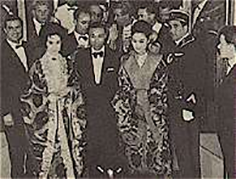
Li Li-Hua, Sir Run Run Shaw and Grace Ting Ning at Cannes Film Festival 1964
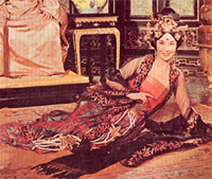
Lin Dai in Yang Kwei Fei, 1961
In Asia, Run Run Shaw’s productions sealed its dominance over the box office with the release of the musical 'Love Eterne' in mid 1963 starring Ivy Ling Po and Betty Loh Tih.
'Love Eterne' was directed by Li Han Hsiang who also directed the 'The Kingdom and the Beauty', 'Empress Wu' and 'The Magnificent Concubine'.
'Love Eterne' set new box office records everywhere it played.
In Taipei alone, it ran in three first run theatres (China, Far Eastern and Capital cinemas managed by Shaw's local agent Minghua Co.) for a total of 62 days, 630 screenings and grossed over HK$1.1 mil, beating all Western, Chinese and Japanese films there. Ivy Ling Po's Love Eterne tour to Taiwan in 1963 created pandemonium attracting over 200,000 fans who greeted her in various locations.
Shaw's successful trend continued for the next two decades, with scores of well made films engaging audiences worldwide.
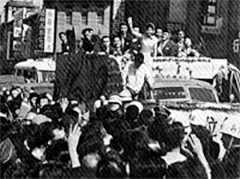
Ivy Ling Po on Love Eterne tour; Taiwan, 1963








